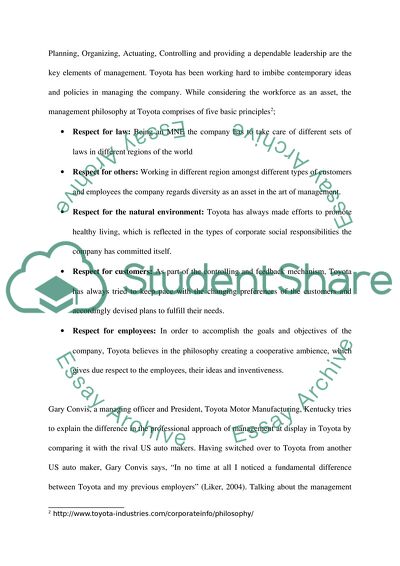
- Home
- Free Samples
- Premium Essays
- Editing Services
- Extra Tools
- Essay Writing Help
- About Us
- Studentshare
- Subjects
- Miscellaneous
- 1.Choose an organisation of your choice. Discuss the way the manager manages his/her managerial tasks (functions) such as planning, organising, controlling and leading. 2.What are the building blocks of competitive advantage Why is obtaining a compet
1.Choose an organisation of your choice. Discuss the way the manager manages his/her managerial tasks (functions) such as planning, organising, controlling and leading. 2.What are the building blocks of competitive advantage Why is obtaining a compet - Essay Example

- Subject: Miscellaneous
- Type: Essay
- Level: Masters
- Pages: 4 (1000 words)
- Downloads: 0
- Author: ethylherzog
Extract of sample "1.Choose an organisation of your choice. Discuss the way the manager manages his/her managerial tasks (functions) such as planning, organising, controlling and leading. 2.What are the building blocks of competitive advantage Why is obtaining a compet"
The company is set to close its factories in Japan for 11 days in the February and March 2009. This is also a part of the management plan to save on the costs in a sagging market (Waterman, 2008). The well set corporate philosophy at the company is working hard to tide over this difficult period as well. Planning, Organizing, Actuating, Controlling and providing a dependable leadership are the key elements of management. Toyota has been working hard to imbibe contemporary ideas and policies in managing the company.
While considering the workforce as an asset, the management philosophy at Toyota comprises of five basic principles2; Respect for customers: As part of the controlling and feedback mechanism, Toyota has always tried to keep pace with the changing preferences of the customers and accordingly devised plans to fulfill their needs. Respect for employees: In order to accomplish the goals and objectives of the company, Toyota believes in the philosophy creating a cooperative ambience, which gives due respect to the employees, their ideas and inventiveness.
Gary Convis, a managing officer and President, Toyota Motor Manufacturing, Kentucky tries to explain the difference in the professional approach of management at display in Toyota by comparing it with the rival US auto makers. Having switched over to Toyota from another US auto maker, Gary Convis says, “In no time at all I noticed a fundamental difference between Toyota and my previous employers” (Liker, 2004). Talking about the management style at the Toyota/ GM Joint venture plant in Fremont, California called NUMMI (New United Motor Manufacturing), he further adds, “I witnessed the transformation of a workforce from one of the worst in the General Motors system to one of the best in any manufacturing facility in the United States”.
The difference is stated to be the ‘Toyota way’, a management
...Download file to see next pages Read MoreCHECK THESE SAMPLES OF 1.Choose an organisation of your choice. Discuss the way the manager manages his/her managerial tasks (functions) such as planning, organising, controlling and leading. 2.What are the building blocks of competitive advantage Why is obtaining a compet
Managerial interview (What you think to be a good manager)
Management and personal development
Tesco: Organizing, Leading, and Planning
The Main Functions and Responsibilities of the Manager
Ten Major Roles of Managers Play within the Organization
Essentials for Managers to Lead and Manage Effectively
Managers Duties in Terms of the Four Functions of Management
Sports Managers' Tasks

- TERMS & CONDITIONS
- PRIVACY POLICY
- COOKIES POLICY